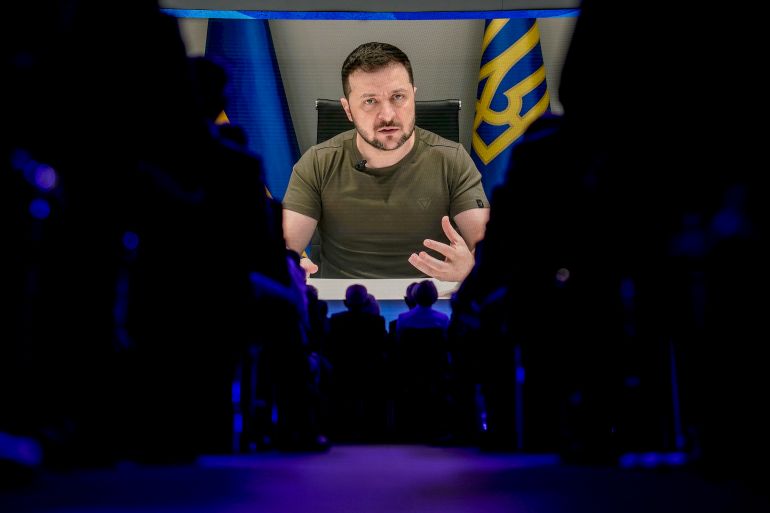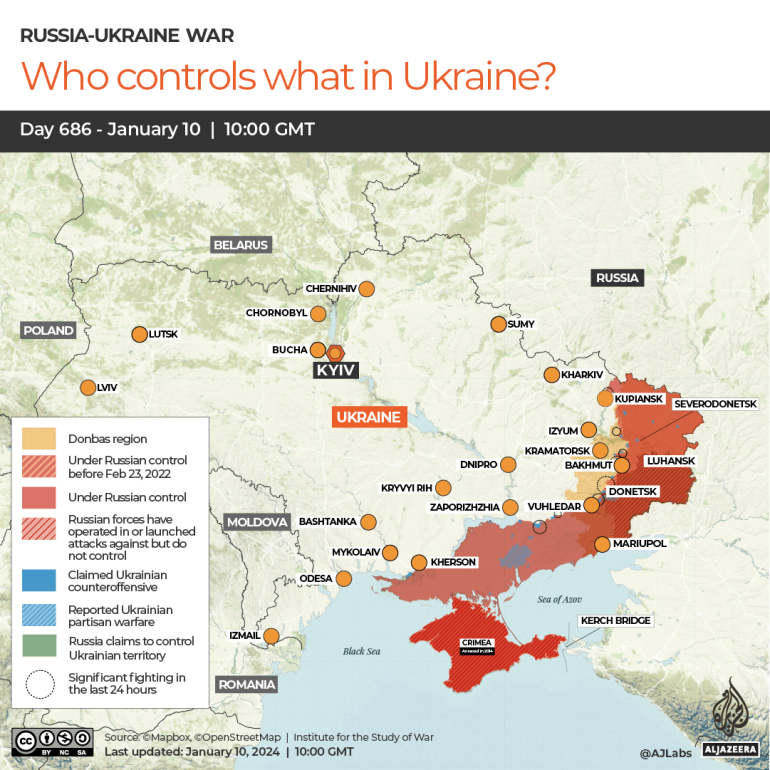Russia dismisses Davos discussion on Ukrainian president’s peace plan
Zelenskyy’s proposal, discussed by 83 delegations, calls for Russia to pull its troops back and face up to war crimes.

Russia has dismissed discussions on a peace plan proposed by Ukraine at the World Economic Forum (WEF) in Davos in Switzerland as pointless.
The talks in the Swiss mountain resort will achieve nothing without Moscow’s participation, the Kremlin’s spokesperson, Dmitry Peskov, insisted on Monday. Organisers said 83 delegations had been present at the meeting to discuss the plan the previous day.
Keep reading
list of 4 itemsUN monitors say North Korean missile struck Ukraine’s Kharkiv
Russia-Ukraine war: List of key events, day 796
Polish farmers suspend blockade of Ukraine border
Put forward by Ukrainian President Volodymyr Zelenskyy, the 10-point peace plan, designed to end the war sparked by Russia’s invasion of its neighbour in February 2022, calls for the withdrawal of Russian troops, restoration of Ukraine’s state borders, and Russian accountability for war crimes.
The proposal was discussed at a summit of national security advisers at the annual WEF meeting on Sunday. Zelenskyy’s plan has previously been discussed at three such gatherings.
Andriy Yermak, the Ukrainian president’s chief of staff, called it a “good sign” that the number of participants in the string of conferences is expanding.
While nearly half of the delegations present on Sunday were from Europe, there were 18 from Asia and 12 from Africa.
“Countries from the Global South are increasingly getting involved in our work. It shows understanding that this European conflict is in fact a challenge for all humanity,” he wrote.
However, Ukraine insists that it will not discuss the plan with Russia. Zelenskyy has decreed that any talks with Russia are illegal.
That has motivated Russia, which controls a little less than a fifth of Ukrainian territory, to dismiss the idea as absurd.
“This is simply talking for the sake of talking,” Peskov said. “This process cannot be aimed at achieving any specific results for the obvious reason – we are not participating. Without our participation, any discussions are devoid of any prospect of any results.”
Ignazio Cassis, the Swiss foreign minister who co-hosted the peace plan discussion in Davos, said the meeting was part of a process aimed eventually at securing Russian participation, although he admitted that Moscow is far from ready to cooperate.

Arms race
Zelenskyy also praised the discussion for including representatives from Latin America, Africa, and Asia.
He arrived in Davos on Monday afternoon on a trip during which he will bid to rally support for Ukraine amid signs of fatigue in the United States and the European Union. He claimed that work on security guarantees and new support packages is progressing.
“There are much-needed agreements on the joint production of weapons and shells, a particularly sensitive issue is drones. There will be more drones. We are preparing more good news on air defence. We keep in mind both missiles and electronic warfare – there will be more of them,” he said.
With the war bogged down in tranches across the front line in eastern Ukraine, air attacks featuring planes, missiles and drones have intensified.
Russian air defence systems destroyed three missiles launched by Ukraine over the southwest Kursk region early on Monday, the Russian Ministry of Defence said on its channel on Telegram messaging app.
Ukraine, meanwhile, reported that it had downed two Russian military command aircraft over the Sea of Azov.
The intensified air war has prompted Ukraine to press harder on Western allies for donations of missiles and air defence equipment.
Meanwhile, Russia has been criticised for breaking international sanctions as it sources weapons from North Korea.
Moscow and Pyongyang have denied arms deals but have declared deepening cooperation across the board. On Monday, Russia’s Foreign Minister Sergey Lavrov welcomed his North Korean counterpart, Choe Son-hui, as she arrived in Moscow on an official visit.